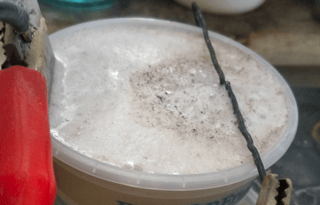I often use electrolysis to remove rust and other junk off of steel parts. My general setup is:
- Electrolyte: Sodium bicarbonate + distilled water.
- Anode: Plain carbon steel
- Cathode: Carbon steel, iron oxides, and "junk" (e.g. stubborn bits of paint, small amounts of oils / greases, etc.)
- Power: 9-24V, 2-10A
Every once in a while, the "junk" on a part (cathode) leads to the formation of foam on the surface of the solution. Of course having a well-cleaned part reduces or prevents this but ... sometimes these things happen.
The problem is: The foam is mostly hydrogen and oxygen gasses, and it's explosive (or flammable or whatever, but it goes boom). And it's near wiring that could spark. So I'd really like to not have any foam.
For example (this is mild compared to some of the situations I've seen) (video of me igniting it):
The pH of the solution in that particular example is ~9.3, if it's relevant.
So my question is: Is there something I can add to the solution that will remove the foam (or prevent it from forming) but that also won't interfere with the reactions at the cathode? Ideally, something that also won't leave me with a hazmat to dispose of, either (NY, USA).
I'm not really sure what keywords to useI'm not really sure what keywords to use in searching, so even some terminology tips would be helpful. (Update: "Antifoaming agents")
Update: Simethicone emulsions are the current best contender; discussion in searching, so even some terminology tips would be helpfulcomments below; will post if I can get consistent good results.

